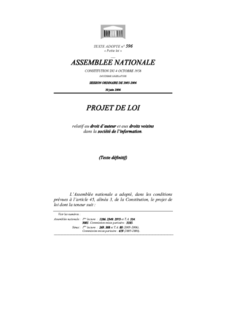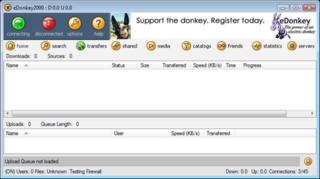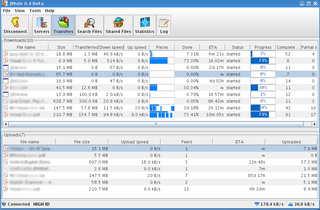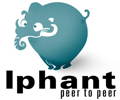The topic of this article may not meet Wikipedia's notability guidelines for products and services .(March 2011) (Learn how and when to remove this template message) |
 | |
eMule MorphXT 12.2 | |
| Original author(s) | Morpheus |
|---|---|
| Developer(s) | Morph team |
| Initial release | January 23, 2003 |
| Stable release | 12.7 (November 21, 2012) [±] |
| Repository | sourceforge |
| Written in | C++ |
| Operating system | Microsoft Windows |
| Type | Peer-to-peer file sharing |
| License | GNU General Public License |
| Website | emulemorph |
eMule MorphXT is a peer-to-peer file sharing application for Microsoft Windows released under the GNU General Public License (GPL), as is its parent software eMule. [1]
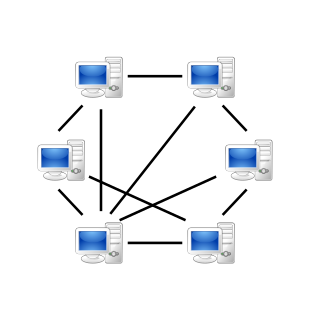
Peer-to-peer (P2P) computing or networking is a distributed application architecture that partitions tasks or workloads between peers. Peers are equally privileged, equipotent participants in the application. They are said to form a peer-to-peer network of nodes.
File sharing is the practice of distributing or providing access to digital media, such as computer programs, multimedia, documents or electronic books. File sharing may be achieved in a number of ways. Common methods of storage, transmission and dispersion include manual sharing utilizing removable media, centralized servers on computer networks, World Wide Web-based hyperlinked documents, and the use of distributed peer-to-peer networking.
Microsoft Windows is a group of several graphical operating system families, all of which are developed, marketed, and sold by Microsoft. Each family caters to a certain sector of the computing industry. Active Windows families include Windows NT and Windows Embedded; these may encompass subfamilies, e.g. Windows Embedded Compact or Windows Server. Defunct Windows families include Windows 9x, Windows Mobile and Windows Phone.
Contents
- History
- Differences from eMule
- Development
- Criticism
- Fake version
- See also
- References
- External links
eMule connects to both the eDonkey network and the Kad network. The distinguishing features of eMule are the direct exchange of sources between client nodes, fast recovery of corrupted downloads, and the use of a credit system to reward frequent uploaders. Furthermore, eMule transmits data and control codes in zlib-compressed form to save bandwidth.
The eDonkey Network is a decentralized, mostly server-based, peer-to-peer file sharing network created in 2000 by US developers Jed McCaleb and Sam Yagan that is best suited to share big files among users, and to provide long term availability of files. Like most sharing networks, it is decentralized, as there is not any central hub for the network; also, files are not stored on a central server but are exchanged directly between users based on the peer-to-peer principle.
The Kad network is a peer-to-peer (P2P) network which implements the Kademlia P2P overlay protocol. The majority of users on the Kad Network are also connected to servers on the eDonkey network, and Kad Network clients typically query known nodes on the eDonkey network in order to find an initial node on the Kad network.

zlib is a software library used for data compression. zlib was written by Jean-loup Gailly and Mark Adler and is an abstraction of the DEFLATE compression algorithm used in their gzip file compression program. zlib is also a crucial component of many software platforms including Linux, Mac OS X, and iOS. It has also been used in gaming consoles such as the PlayStation 4, PlayStation 3, Wii U, Wii, Xbox One and Xbox 360.

